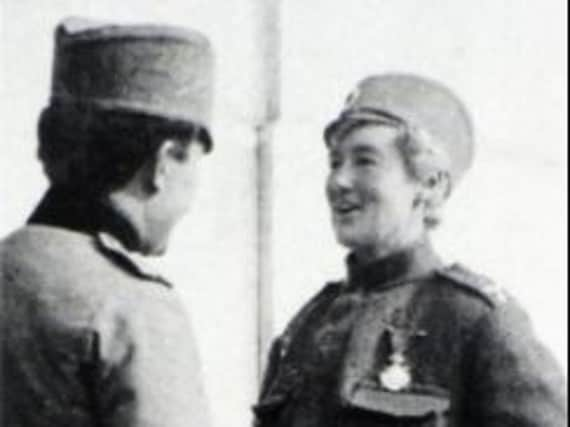The Yorkshire women of the war who defied the Nazis


The contribution from thousands of Yorkshire women during both world wars is part of this celebration, as the thousands of Yorkshire women who stepped into roles previously denied to their gender, getting paid less than their male counterparts in the process, is something which should not be forgotten.
Women were needed in order to keep the country going whilst the men were away at war, and their relentless efforts aided in Britain's victory and the defeat of both the Kaiser and Hitler.
Advertisement
Hide AdAdvertisement
Hide AdBritish aviator Amy Johnson CBE, born in Hull, firmly made her mark before the war by being the first woman to fly solo from England to Australia in 1930. However, she also valiantly contributed to the war effort as she joined the Air Transport Auxiliary in 1940 and aided the Royal Air Force by transporting military weapons and vehicles around the country. She died in service whilst transferring an Airspeed Oxford plane from Blackpool to RAF Kidlington and was posthumously awarded the Albert Medal, now more commonly known as the George Cross.
Flora Sandes, born in Nether Poppleton, York, also worked in a military position, and was the only British woman to serve as a solider in WWI. In 1914, she volunteered with a Serbian ambulance unit and in 1915 she enlisted with the Serbian army, where she rose to the rank of captain.
Yorkshire women were also enlisted as Land Girls during both wars, tirelessly farming to ensure the nation was fed. Stockton House in North Yorkshire was just one of 50 hostels in Yorkshire which housed just some of the 5,000 Land Girls in the region during WWII. This included Scarborough-born Dorothy Buckton who was first posted to a remote farm in the Yorkshire Dales before being moved to Stockton House.
During WWI, the 'Barnbow lasses' worked in the Barnbow Munitions Factory in Leeds, making ammunition to be used in the war. The Barnbow Royal Ordinance Factory, situated one mile away from the original munitions factory, also employed local women during WWII to make much needed military equipment.
Advertisement
Hide AdAdvertisement
Hide AdYorkshire women also worked tirelessly in the South Yorkshire steel factories during both world wars, but their effort to keep the steel mills going, often juggling family duties with heavy industrial work, was relatively unrecognised until a campaign aiming to change this went to Downing Street in 2010. These women, now aptly known as the 'Women of Steel', finally acheived recognition when a bronze statue commemorating their work was unveiled in Sheffield in 2016.
The 'Lumberjills' were also forgotten women of WWII. These women were part of the Women's Timber Corps and provided timber which was crucially needed in the war effort, being used to make items such as pit props, which was needed to retrieve coal. This work was highly physical as it required these women to cut down trees using hand-held tools. The Forestry Commission is now working to ensure that the legacy of the 'Lumberjills' is not forgotten.
Yorkshire women were part of the larger circle of women throughout Britain, who worked tirelessly to ensure that the roles previously undertaken by men continued to run. By providing much needed food, ammunition and equipment, their contributions aided the war effort not only in the UK but overseas, and it is highly important that their heroic work is never forgotten.